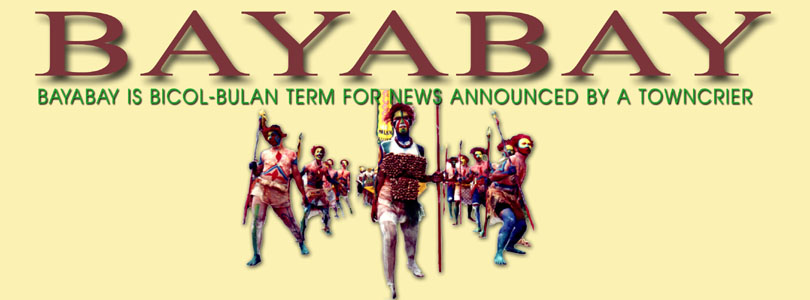 When Bulan Means Not The Moon
When Bulan Means Not The Moon An entry in the Spanish document, Relacion de Encomiendas de Ybalon, traces the origin of Bulan's name from an account that began with the rising of the moon on a coastal town along Ticao Pass.
As the radiance of the moon blanketed the coastal settlement, a native crew of a passing galleon shouted in jubilation, Bulan! Bulan! Pointing at a direction where the moon was rising. Rushing to the deck, a Spanish official saw the native crewmember jumping with joy, who seemed to be pointing at the moon. The Spanish official then took it to mean the name of the place where the moon was rising and therefore noted it as such. Thus Bulan has earned its name - from the mystifying glow of the moon and the perennial errors committed by Spanish chroniclers.
Such an account would seem to convey that prior to Spanish conquest we did not have names for our places. The Spaniards had to name them for us. Or worse, the Spaniards were stupid chroniclers for rushing to conclusions at the first babble of the natives. But in retrospect, the Spanish account maybe correct. It was the appreciation that went wrong. So let's try it again:
"One night a Spanish galleon traversed the Ticao Pass on its way to Manila from one of its missions to settle parts of the Visayas. As it passed the coast of Bulan, the full moon was just rising from the horizon. As part of it was already visible, there was a shout of jubilation from the native crew who was at the right portboard of the galleon, resting after a hard day's work. The Spanish official, who was on the deck at the time, asked what the jubilation was all about. The natives pointed at the half-hidden moon, "Bulan! Bulan!" The Spanish official took it to mean the name of the place where the moon was just rising."
So what was the cause of the natives' jubilation? The rising moon? Was that the first time the natives ever saw the moon? Or was it the sight of their settlement?
Luis Camara Dery, in his History of the Ibalon, reported the abductions of women and children by raiding pirates in Sorsogon. Other Philippine historians likewise reported on the trading of these captives for slaves sometimes ending to be crewmembers of the Spanish galleons.
Were the native crewmembers referred to in the Ybalon account natives of Bulan? After a long voyage from Acapulco (Mexico) and with no prospects of ever seeing their home again, the natives were excited and jubilant as they saw for the first time their moonlit settlement.
Rightly then, they were pointing at their coastal settlement, not the moon, shouting its name: Bulan! Bulan!, as Spielberg's alien E.T. did point at the vast space - not the moon.
The Spanish chroniclers were not stupid after all. And Bulan had a name even before Malakas became to be Juan.


